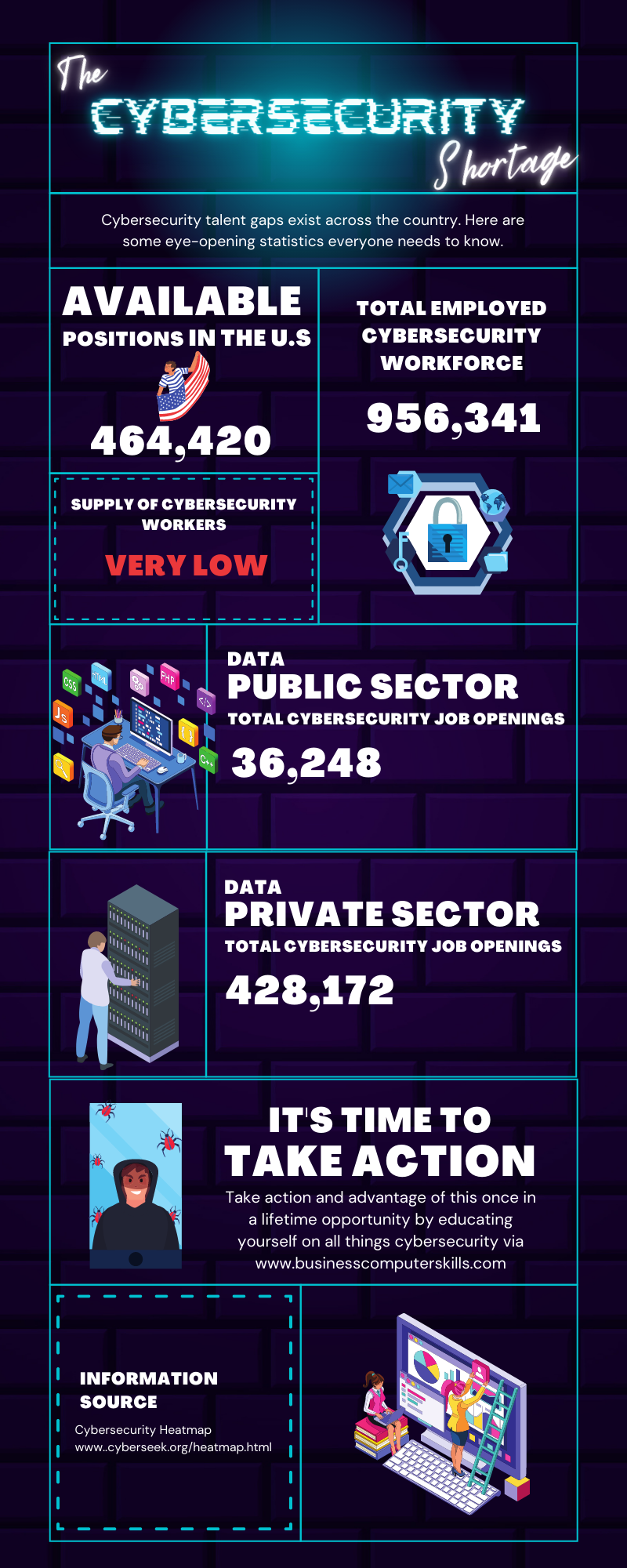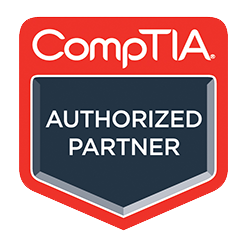 |
How to Start a Career in Cybersecurity |

The Cybersecurity industry is exploding. What was once a small niche field, has become a booming industry with countless career opportunities sprouting worldwide. But what is Cybersecurity exactly? What are the job types in this field? And what Cybersecurity qualifications will you need to get started?
We will try the answers to all of these questions and help you get on the right track to start your Cybersecurity career, so let's get started.
What is Cybersecurity?
Cybersecurity is the craft of protecting against Cyber attacks on the computer networks, data and hardware of organizations and individuals.
On an individual level, Cybersecurity is about protecting your digital devices and the personal information within them. On a larger scale, Cybersecurity is primarily about protecting computer networks and hardware from digital attacks by hackers who want access to sensitive data, create ransom attacks, or disrupt normal business processes.

Society is moving more and more of their daily lives into the digital realm. We are increasingly exposed to the threats posed by Cyber criminals. Large scale attacks like Solar Winds, customer data breaches at T-Mobile and Facebook, or getting your personal email hacked are all examples of the threats society faces on a daily basis.
As a result, Cybersecurity professionals are now in higher demand than ever before. They are needed in every industry to ensure that computer systems and networks are secure, as well as the data they store. There are a number of career paths and countless opportunities for growth in an ever-changing market with new technologies being developed all of the time.
By 2023, spending on cloud security tools is expected to reach $12.6 billion, while infrastructure protection is suspected to climb to over $25 billion. All of this spending presents an exciting opportunity for young professionals entering this field of work.
Cybersecurity Job Outlook
The outlook for Cybersecurity jobs is exceptional for the foreseeable future. There is a significant lack of qualified candidates and over half a million unfilled Cyber jobs in the United States alone.
At the time this article was published, there were 36,248 Cyber Security job openings for Public Sector organizations, and an astounding 428,172 Private Sector openings available.

With such a high number of open positions, the demand qualified Cyber Professionals is at an all time high. Employers are paying exceptional salaries for quality talent, with an entry level Cyber Security Analyst starting off at $82,565 on average, and experienced Security Architects earning around $153,439 on average.
The opportunity is there for you. So let's take a look at some ways you can get started.
How to Start a Career in Cybersecurity
If you're interested in a career in Cybersecurity, there are many ways to get started. What qualifications you'll need will depend on the type of job role that interests you.
As with most IT roles, ideal candidates possesses a blend of the following credentials:
- University Degree (Bachelors or Masters Degree)
- Professional Certifications
- Relevant Work Experience

Getting started on any new career path may seem daunting, but with some hard work and planning you will be on your way in no time. Here are some of the typical ways candidates will get their foot through the door.
Earn a Certification
Vendor Neutral Certifications
You can earn Cybersecurity certifications through vendor-neutral organizations such as EC-Council, CertNexus, ISC2 and ISACA to prove your expertise and knowledge in universally accepted frameworks. As Cyber Security standards develop and evolve, many professionals are opting for vendor neutral certifications, as they will prepare the candidates to
Vendor Specific Certifications
Cybersecurity certifications are offered by large technology such as AWS, IBM, CISCO, Citrix, Google and Microsoft to establish expertise and knowledge in their proprietary technologies. These certifications are very beneficial for starting a career and advancing within these organizations, but limit the candidate to working within those proprietary systems.
Whether pursuing Vendor Neutral or Vendor-Specific certifications, students will typically take certification training classes at companies like Business Computer Skills to help them prepare for the certification exams. There are a variety of training options available to accommodate most schedules.
If you're working in the tech industry already, there are ample opportunities to upgrade your skills through instructor-led or Online training courses. This will help you gain a better understanding of the technologies that Cybersecurity professionals use daily, and could potentially lead to an exciting career change down the line!
Get a Degree
Earning an undergraduate degree in Cybersecurity from an accredited university is also an excellent way to get your career jump started. Employers will always value the commitment it takes to complete a degree when it comes to evaluating candidates.
Related degrees like Computer Science and Information Technology are also beneficial, but some addition Cyber related courses may be needed to round out your skill set. Each school's curriculum varies, so you will need to research what skills are required for the potion you are targeting.
Get an Internship
Getting an internship with a Cyber Security firm, or in an IT department can be invaluable.
- Gain valuable first-hand experience working with and learning from Cyber Professionals.
- Opportunity to build your reputation within that organization.
- Give yourself an edge when looking for your first full-time position.
- Build strong professional connections.
- Gain an understanding of what it take to succeed in this field.
- Help you understand where you want to focus your education and training.
- Get to see if you enjoy this type of work.
There is no better experience than experience.
Review Open Job Listings
If you are not sure what skills you need to build. The best place to get started is by reviewing job postings for the positions you are interested in obtaining.
Employers will normally provide a detailed set of requirements they are looking for in an ideal candidate. We know that each job posting is different, but if you analyze the common requirements from 10-20 posts for similar potions, you should be able to determine the core skill set and experience level required to get hired for that role.
With that information in hand, you can make sound decisions on how to focus your time and resources to accomplish your goals.
Cybersecurity Training
Cybersecurity training is another excellent way to build up your credentials and expertise in this field. Like gaining certifications, they are entirely remote and boast flexible schedules around your daily life.

Throughout your Cybersecurity training, you'll have access to the latest technologies, as well as some of the most experienced Cybersecurity instructors from around the globe. In addition, you will gain the skills and knowledge needed to confidently enter into this field of work.
You can learn anything from penetration testing and ethical hacking, to gaining valuable insights into cloud computing services! As Cybersecurity training is vendor-neutral, it won't matter what technology your organization uses; the course content will always be beneficial and relevant to your needs.
Cybersecurity Jobs
While there are many ways to start, each role requires different qualifications. Here is a list of potential Cybersecurity jobs and the kinds of Cybersecurity degrees and Cybersecurity qualifications that will be beneficial for each one:
- Security Engineer - A security engineer analyzes security requirements, designs solutions to meet those requirements, and implements the solution. They also manage Cyber security systems once they are deployed.
- Penetration Tester - A penetration tester works with network system owners and web-based application providers to probe for vulnerabilities that hackers with nefarious intent might be able to exploit to gather secure data and intelligence.
- Security Architect - A security architect is a senior-level position, responsible for the overall design of an organization's Cyber defense systems. They are responsible for assessing their company's needs, designing Cyber security architectures to meet those needs, implementing systems, and overseeing systems.
- Cyber Security Analyst - A cybersecurity analyst researches current IT trends, identifys weaknesses in networks, and creates contingency plans by patching the vulnerabilities, responding to security breaches, reviewing suspicious activities, and reporting breaches.
- Data Scientist/Analyst - A data scientist analyzes large amounts of digital information and discerns patterns from it. They help businesses make better decisions by providing a statistical analysis of the gathered information in relation to Cyber security threats. Their work requires an understanding of statistics, machine learning, modeling, programming languages such as Python, C/C++, or Java, and database management.
- Compliance Manager/Officer - A compliance manager is responsible for implementing and monitoring their company's information security program. They must be knowledgeable of the laws, regulations, policies, standards, and guidelines that pertain to protecting sensitive data against Cyber threats.
- Cryptographer - A cryptographer is responsible for developing and applying cryptography, the art of protecting information by converting it between readable form and unreadable form. They design cryptographic algorithms that encrypt data or electronically scramble it so unauthorized individuals cannot access its contents.
- Information Security Engineer - - Information security engineers are responsible for designing, securing, implementing, and maintaining systems. What sets them apart from a system architect is their knowledge of network protocols which can be leveraged to design or improve an information security program.
- Information Systems Auditor - An information systems auditor is a professional who audits information security and Cyber control processes within an organization. They assess the efficacy of these processes and procedures, both in computer systems and human resources.
- Computer Crime Investigator - A computer crime investigator investigates cybercrimes, such as unauthorized access to or dissemination of sensitive information. They interview potential victims and witnesses, gather related documentation for evidence, track down perpetrators, and present their findings during trial proceedings.
- Cybercrime Intelligence Analyst - A cybercrime intelligence analyst analyzes data to develop profiles on potential perpetrators of cybercrimes. They sift through large amounts of information, including public records and internet postings, looking for leads based on the data gathered.
10 Most Popular Cyber Security Certifications

Most Cyber security jobs will require a bachelor's degree in computer science or a related field. However, if you're looking to amp up your qualifications and ensure you land the job, you could enroll in many beneficial Cyber security courses in order to gain Cyber security certifications.
There are many different Cyber security certifications that you can earn to help your career prospects. Here is a list of the top 10 Cyber security certifications and the strengths they convey:
CEH: Certified Ethical Hacker (EC-Council)
The CEH certification demonstrates the certificate holder's ability to thwart malicious hacking attempts through preventative counter-measures, and to use penetrating testing tools to compromise various systems in an effort to expose system vulnerabilities
CEH certifications are offered by EC-Council. Business Computer Skills provides CEH Certification Training courses.
-
CND: Certified Network Defender (EC-Council)
The CND certification illustrates the certificate holder's ability to assess networks for security vulnerabilities, administer systems securely and control network access at various levels within an IT infrastructure.
CND certifications are offered by EC-Council. Business Computer Skills provides CND Certification Training courses.
CCISO – Certified Chief Information Security Officer – (EC-Council)
CCISO certification is designed for security professionals in the IT field with proven managerial skills. The program teaches top managers how to build and maintain a successful information security management system within an organization, as well as measuring its compliance against industry standards.
This certification can be earned by attending EC-Council's CCISO course. Business Computer Skills offers CCISO Certification training courses.
CISA—Certified Information Systems Auditor - (ISACA)
Becoming CISA certified enhances knowledge, skills, and abilities as an auditor. It shows that a CISA can identify vulnerabilities within the organization, and implement controls to protect it from threats, while reporting compliance standards for audits.
This certification is offered by ISACA. Business Computer Skills provides CISA training courses.
CISM - Certified Information Security Manager (ISACA)
The CISM certification proves that a person has all of the required skills to do their job. They should be able to run risk analyses and present their results clearly. CISM holders are diligent, recording each step for security purposes. They can also design security systems themselves if necessary.
This is another certification offered by ISACA. Business Computer Skills can help you prepare for this certification.
CISSP- ISSMP - Information Systems Security Management Professional (ISC)²:)
The CISSP-ISSMP is a follow-up to the basic CISSP certification, which covers many areas of Cyber security practice. This exam tests your ability to manage risk within an organization by implementing security controls.
This certification can be earned by attending ISC² CISSP training courses. Business Computer Skills offers the CISSP Certification training course.
CCSP - CCSP Certified Cloud Security Professional ((ISC)²: )
This certification proves that a person has the knowledge of cloud security. They know how to assess an organization's needs for implementing cloud technology, and can design more secure system architectures within networks.
This certification can be earned by attending ISC² CCSP training courses. Business Computer Skills offers the CCSP Certification training course.
Security+ (CompTIA)
The Security+ certification establishes the core knowledge needed to work in Cybersecurity It provides a good foundation for further certifications and is considered essential by employers, as it allows candidates to practice hands-on problem-solving skills that are crucial for real-life security issues.
Business Computer Skills offers CompTIA's Security+ certification training courses.
CySA+ (Cybersecurity Analyst) (CompTIA)
CompTIA CySA+ streamlines security efforts by unifying behavioral analytics and threat visibility into a single solution that helps IT pros combat malware, advanced persistent threats (APTs), and other malicious activity. This certification will prove your ability to defend against the unknown in order to improve overall network security within organizations.
Business Computer Skills offers CompTIA's CySA+ certification training courses.
Cybersec First Responder (CertNexus)
The CyberSec First Responder (CFR) certification is a rigorous, comprehensive exam that tests the knowledge and skills required to protect information systems from Cyber threats. A well-rounded understanding of tools used in Cybersecurity, such as processes and strategies, is necessary for professionals defending their organization's data against increasingly sophisticated attackers.
Business Computer Skills offers CFR certification training courses.
Vendor-Neutral Certification Bodies
As you can see from the information above, most Cybersecurity jobs will require a bachelor's degree in computer science or a related field. However, if you're looking to amp up your qualifications and ensure you land the role, you could enroll in various beneficial courses that would help you prepare to earn a Cybersecurity certification.
There are many different Cybersecurity certifications that you can earn to help your career prospects. Here is a list of the top Cybersecurity certification bodies and the most popular certifications they offer:
- CertNexus - CertNexus is a leading certification body that provides relevant certifications for professionals. Cybersecurity certifications from CertNexus are designed to meet the needs of employers and learners, giving them access to cutting-edge technology in their desired industry, such as Business, Data, Development, IT, and Security professionals.
Business Computer Skills is an authorized Certnexus Training Parnter.

- CompTIA - CompTIA is a leading certification body that offers a variety of vendor-neutral certifications in the areas of computer hardware, networking and cyber security. Popular cyber certifications include: Security+, CySa+, Pentest+ and CASP+
Business Computer Skills is an authorized CompTIA Training Parnter.

- EC-Council - EC-Council is an organization specializing in information security and Cybersecurity training. EC-Council provides certifications with various fields of specialization, such as Computer Hacking Forensic Investigator (CHFI), Certified Ethical Hacker (CEH), Licensed Penetration Tester (LPT), Network Security Administrator, Disaster Recovery Professional, Cybersecurity Specialist, etc.
Business Computer Skills is an authorized EC-Council Training Parnter.

- ISO/IEC - ISO/IEC is an international organization that manages various best practices and standards across the globe. They have a network of over 162 countries, and their Cybersecurity certifications cover areas such as Cloud Security, Risk Management Framework (RMF), Identity Access Management (IAM) Framework, Cybersecurity Fundamentals, etc.
Business Computer Skills is an authorized ISO/IEC Training Provider.

- (ISC)² - (ISC)² provides Cybersecurity certifications that are highly sought after by employers. These particular certifications revolve around a set of industry-defining credentials that designate the certified candidate has high competency in specific, technical areas. Popular certifications include CISSP, CCSP and SSCP.
Vendor Specific Certifications
As you can see from the information above, most Cybersecurity jobs will require a bachelor's degree in computer science or a related field. However, if you're looking to amp up your qualifications and ensure you land the role, you could enroll in various beneficial courses that would help you prepare to earn a Cybersecurity certification.
There are many different Cybersecurity certifications that you can earn in vendor specific topics that will help you specialize your skillset within that organization. Here is a partial list of the top organizations that offer cybersecurity certifications for their proprietary platforms:
- AWS - AWS is the global leader in cloud computing services. AWS offers professional certifications in a number of different disciplines assiciated with it's cloud platform. AWS's main Cybersecurity certification is called AWS Certified Security - Specialty.
- Cisco - Cisco is global leader in IT and Networking equipment and software. Cisco offers professional certifications in a number of different disciplines assiciated with it's networking platform. Cisco offers four different Cybersecurity certifications named: CyberOps Associate, CyberOps Professional, CCNP Security and CCIE Security.
- Google - Google is the global leader in internet search and also specializes online advertising and cloud computing. Google offers professional certifications in a number of different disciplines assiciated with it's cloud platform. Google Cloud's main Cybersecurity certification is called Google Certified Professional Cloud Security Engineer.
- IBM - IBM is a global leader in computer hardware software and middleware, and has positioned itself as a driving force in IT innovation for the past century. IBM offers professional certifications in a number of different disciplines assiciated with it's various products and services. IBM offers over 8 different Cyber Security related certifications.
- Microsoft - Microsoft is a global leader in computer hardware, software, gaming systems and clopud services. Microsoft offers professional certifications in a number of different disciplines assiciated with it's various products and services. Microsoft offers 5 different Cyber Security related certifications for their Windows, Azure and Microsoft 365 paltforms.
- Oracle - Oracle is a world leader in relational database platforms, cloud infrastructure and cloud applications. Oracle offers professional certifications in a number of different disciplines assiciated with it's cloud services. Oracles's main Cybersecurity certification is called CASB Cloud -Specialist.
- Red Hat - Red Hat is a subsidiary of IBM and specializes in entrprise level open source solutions for Linux, Kubernetes, cloud and container. Red Hat offers over 20 professional certifications in a number of different disciplines assiciated with it's various services. Red Hat's main Cybersecurity certification is called Red Hat Certified Specialist in Security: Linux.
- Juniper Networks - Juniper Networks specializes in network security and is also a leading provider of cloud networking solutions. Juniper provides certificates, training courses, services, software, hardware, and more to meet the needs of today's Cyber-savvy workforce. They also develop networking hardware, such as routers and switches, and create network management software to handle the different aspects of managing a company's IT infrastructure. Juniper offers professional certifications in a number of different disciplines assiciated with it's networking and cloud platforms. Juniper offers four different Cybersecurity certifications named: JNCIA-SEC, JNCIS-SEC, JNCIP-SEC and JNCIE-SEC.
- Palo Alto - Palo Alto is a Cybersecurity solutions company providing enterprise-grade products, services, and training to organizations across the globe. They boast advanced firewalls, and many other cloud-based security offerings. Palo Alto offers five different Cybersecurity certifications named: Prisma Certified Cloud Security Engineer, Palo Alto Networks Certified Network Security Engineer, Palo Alto Networks Certified Security Automation Engineer, Palo Alto Networks Certified Network Security Administrator, and Palo Alto Networks Certified Cybersecurity Entry-level Technician.
Start Your Cybersecurity Career Today!
Cybersecurity is one of the fastest-growing industries in the world. With a huge demand for qualified Cyber professionals, now is as good a time as any to start your career! Our team can help you get started by providing Cybersecurity degrees and certifications that will put you on track to be hired immediately.
Interested in learning more? Reach out to us today by clicking here!
Guide Topics


